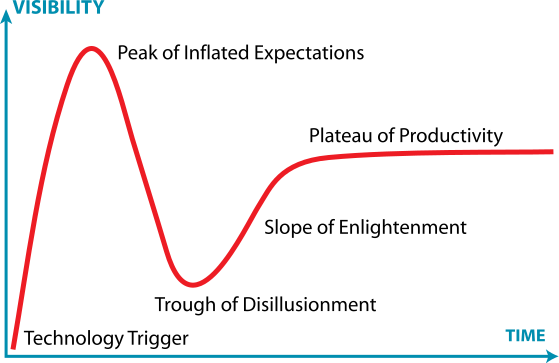Every December, tech pundits like me speculate about what's next. We look into our crystal balls and make predictions about the next big thing. According to this Slashdot article, that thing may be Big Data. From the piece:
CIOs believe that analytics, business intelligence (BI) and Big Data will constitute one of the most disruptive technologies in 2013, according to a new survey by Constellation Research.
The research firm surveyed 105 CIOs, a relatively small sample size. Of those respondents, 48.73 percent felt that analytics, BI and Big Data would become a top disruptive technology in 2013. That lagged behind cloud deployment, which 56.37 percent of surveyed CIOs thought would prove a disruptive technology, and mobile enablement [sic] at 60.19 percent.
As the piece points out, 105 CIOs isn't a terribly large number. Despite that, the Big Data hype cycle is in full swing:

On a professional level, I'm betting big on Big Data. (It will be the topic of my next book). I believe that 2013 will see massive deployments of Hadoop and other Big Data technologies for two main reasons.
Carrots
Big Data is simply too big to ignore. In retail, for instance, margins are very low unless you're Apple - and they're getting lower. (Amazon's P/E ratio as I write this is more than 3,000:1.) Any insights you can glean from large streams of data go directly to the bottom line. While Big Data is anything but mature, more and more organizations will take the plunge because its potential benefits are so alluring.
Sticks
Perhaps more important than economic benefits, many organizations will be forced to use Big Data because they don't have a choice. Different parts of municipal, state and the federal governments are currently looking at ways to leverage Big Data. Entire conferences are devoted to this topic.
Sure, I'd like to believe that, regardless of political persuasion, we all want government to be more innovative and efficient. The skeptic in me believes, though, that the public sector will only change when faced with dire consequences. As we see in cities like Harrisburg, PA and states like California, budget crises are forcing innovation. In other words, the stick is more effective than the carrot in inducing change.
Simon Says
Whether organizations are embracing Big Data and analytics because they have to or because they want to is ultimately irrelevant. Perhaps it's a combination of those reasons - or different ones altogether. Regardless, 2013 will be the year that Big Data gains significant traction.
Feedback
What say you?
